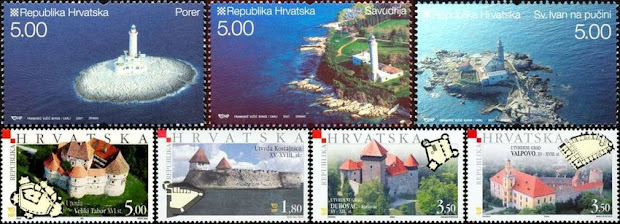Faust Vrančić, born in Šibenik is honoured as one of Croatia's greatest inventors and thinkers. He was a learned man, which meant in his days that he was active in many sciences: philosophy, history, lexicography and so on. But which were those days? New research suggests he was born on 1 January 1551 and died on 20 January 1617. His birthplace is now known too, and I have no doubt that Šibenik will turn that house into a tourist trap. I mean tourist attraction, of course.
Vrančić is mostly remembered for his parachute, which he called Homo volens, flying man. In 1617 he seems to have jumped from a tower in Venice to demonstrate his invention.
 Considering the fact that Vrančić died on 20 January 1617, I suspect that his parachute did not work or that he caught a fatal cold, as I could not find any information about his death. Among his numerous achievements - suspension bridge, wind turbine - Vrančić's book with the lengthy title Dictionarium quinque nobilissimarum Europeae linguarum; Latinae, Italicae, Germanicae, Dalmaticae et Hungaricae stands out. In plain English: Dictionary of the five noblest European languages, Latin, Italian, German, Croatian and Hungarian. As you may conclude from the title, many countries have colonised Croatia but Britain was not one of them. You can read the work online (have some patience with user-unfriendly system) as it is one of the few books that the National and Scientific Library in Zagreb has digitalised so far.
Considering the fact that Vrančić died on 20 January 1617, I suspect that his parachute did not work or that he caught a fatal cold, as I could not find any information about his death. Among his numerous achievements - suspension bridge, wind turbine - Vrančić's book with the lengthy title Dictionarium quinque nobilissimarum Europeae linguarum; Latinae, Italicae, Germanicae, Dalmaticae et Hungaricae stands out. In plain English: Dictionary of the five noblest European languages, Latin, Italian, German, Croatian and Hungarian. As you may conclude from the title, many countries have colonised Croatia but Britain was not one of them. You can read the work online (have some patience with user-unfriendly system) as it is one of the few books that the National and Scientific Library in Zagreb has digitalised so far.
Vrančić is mostly remembered for his parachute, which he called Homo volens, flying man. In 1617 he seems to have jumped from a tower in Venice to demonstrate his invention.
 Considering the fact that Vrančić died on 20 January 1617, I suspect that his parachute did not work or that he caught a fatal cold, as I could not find any information about his death. Among his numerous achievements - suspension bridge, wind turbine - Vrančić's book with the lengthy title Dictionarium quinque nobilissimarum Europeae linguarum; Latinae, Italicae, Germanicae, Dalmaticae et Hungaricae stands out. In plain English: Dictionary of the five noblest European languages, Latin, Italian, German, Croatian and Hungarian. As you may conclude from the title, many countries have colonised Croatia but Britain was not one of them. You can read the work online (have some patience with user-unfriendly system) as it is one of the few books that the National and Scientific Library in Zagreb has digitalised so far.
Considering the fact that Vrančić died on 20 January 1617, I suspect that his parachute did not work or that he caught a fatal cold, as I could not find any information about his death. Among his numerous achievements - suspension bridge, wind turbine - Vrančić's book with the lengthy title Dictionarium quinque nobilissimarum Europeae linguarum; Latinae, Italicae, Germanicae, Dalmaticae et Hungaricae stands out. In plain English: Dictionary of the five noblest European languages, Latin, Italian, German, Croatian and Hungarian. As you may conclude from the title, many countries have colonised Croatia but Britain was not one of them. You can read the work online (have some patience with user-unfriendly system) as it is one of the few books that the National and Scientific Library in Zagreb has digitalised so far.




0 reacties:
Post a Comment